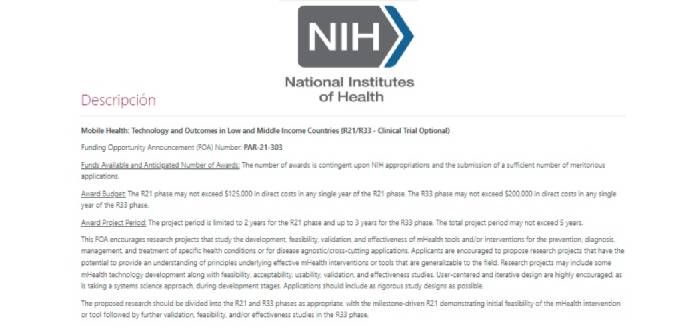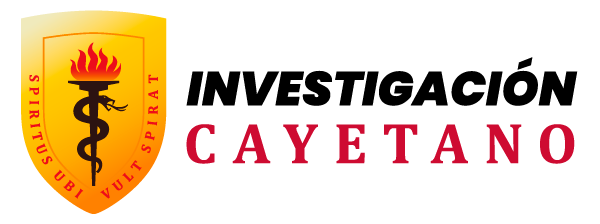Mobile Health Technology and Outcomes in Low and Middle Income Countries

Funding Opportunity Announcement (FOA) Number: PAR-21-303

Funding Opportunity Announcement (FOA) Number: PAR-21-303
Funds Available and Anticipated Number of Awards: The number of awards is contingent upon NIH appropriations and the submission of a sufficient number of meritorious applications.
Award Budget: The R21 phase may not exceed $125,000 in direct costs in any single year of the R21 phase. The R33 phase may not exceed $200,000 in direct costs in any single year of the R33 phase.
Award Project Period: The project period is limited to 2 years for the R21 phase and up to 3 years for the R33 phase. The total project period may not exceed 5 years.
This FOA encourages research projects that study the development, feasibility, validation, and effectiveness of mHealth tools and/or interventions for the prevention, diagnosis, management, and treatment of specific health conditions or for disease agnostic/cross-cutting applications. Applicants are encouraged to propose research projects that have the potential to provide an understanding of principles underlying effective mHealth interventions or tools that are generalizable to the field. Research projects may include some mHealth technology development along with feasibility, acceptability, usability, validation, and effectiveness studies. User-centered and iterative design are highly encouraged, as is taking a systems science approach, during development stages. Applications should include as rigorous study designs as possible.
The proposed research should be divided into the R21 and R33 phases as appropriate, with the milestone-driven R21 demonstrating initial feasibility of the mHealth intervention or tool followed by further validation, feasibility, and/or effectiveness studies in the R33 phase.
Important Points for Consideration:
1. If the mHealth intervention or tool aims to produce a specific clinical outcome, applicants should incorporate appropriate biological variables (such as sex) and endpoints and/or observational behavioral data to measure this outcome.
2. Interventions that aim to produce behavior change should be based on existing social and behavioral science theories.
3. The interventions or tools studied should take advantage of the unique functionality of mobile and wireless devices. Utilization of real-time data collection and feedback is encouraged where appropriate.
4. New software, devices, and systems should be interoperable with existing infrastructure and resulting data should integrate with relevant health information systems where applicable.
5. The reliability, safety, simplicity, affordability, durability, and power requirements of new technology being studied should be considered in the LMIC context where it will be used. Devices, interventions, and tools should be developed with a deep understanding of the LMIC context and populations, including their differential effects on women and men or on particular groups of women and men (such as pregnant women or sexual and gender minorities). Additionally, appropriate privacy and security considerations should be made.
Open Date (Earliest Submission Date): October 15, 2021
Link en SIDISI: https://intranet.upch.edu.pe/sidisi/convocatoria/public/index/id/167



